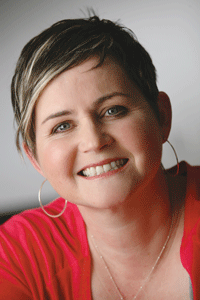By: Abby Dees*/Special to TRT–
Having friends who don’t share your political views is very inconvenient. It requires you to think in terms of individuals, rather than lump everyone you disagree with into a tidy group that is (pick one:) stupid, greedy, evil, brainwashed or out to get you. It means you have to get your news from multiple sources and that takes so darn much time. It’s much easier to know there are only two types of people in the world: us and them. Then we can use our critical thinking skills for other things, like deciding who deserves our vote on “The X Factor.”
Last week I ran into an old, dear friend. The last time we met was almost 30 years ago when we were still basically kids. She was the kind of person who made you smile just to look at her. Bright eyed and curious, she always led with her heart; I remember that most vividly after all these years. The person I met last week was no different, except perhaps more settled and confident – the lovely patina that comes with age. My friend told me that since we last met, she had become born again and involved with the local Tea Party group.
To a typical tree-hugging lesbian, this combo rarely suggests “ally,” and yet here I was with my old friend who has only ever been someone I’d consider an ally. And this week she gave me no reason to think that’s changed. I don’t actually know what she thinks about things like same-sex marriage, abortion, immigration, or whatever. I do know that she was genuinely happy to hear that I’m happy. It’s mutual and I’m glad we found each other again.
So, like I said, most inconvenient. It would be so much easier to think my friend had become a fundamentally different person or was under the insidious influence of some nutty political propaganda. I could maintain a nice us/them view of the world…and nothing would ever change.
This is the problem when we get lazy about our politics and opinions. If we stay in our respective camps of people we agree with, we lose the opportunity to find common ground. And maybe “common ground” is too common a term. When I think about my friends, it feels more like common humanity.
As I watch so many right-wing talking heads on TV railing about the gay agenda, I always feel like they turn us into cartoon versions of people – two-dimensional characters intent only on dismantling what’s important to other, “real” Americans. Yet when I think about LGBT rights, I imagine a million ordinary people who only want what everybody wants: family, love, and security. I picture closeted kids in small towns wondering if they will ever get to truly be who they are. It makes my heart ache. “Why is this so frickin’ hard to understand?” I keep asking the TV.
Then I fall into that trap myself, thinking that those talking heads represent all of “them,” the other side that is so firmly against “us.” Where does my friend fall into that narrative? Is she one of the few exceptions? Those exceptions I keep meeting? Is it really possible that each one of my conservative friends or family is a very rare outlier? Am I that good at sniffing people out? Or are they hypocrites? Am I?
Frankly, we’re all probably hypocrites on some level. Lord knows I thought Bush’s tax cuts were obscene. And in the few ways they extended to me, I was happy to take full advantage of them.
But calling people hypocrites and then expecting change is unproductive and, well, hypocritical. My friends and I, by definition, have each other’s back. Disagreement between us is painful sometimes, so I must remember what I know for sure: They too only want family, love and security. In pursuit of these things, we are all guilty of having irrational fears and blind spots, and we are each doing the best we can in a confusing and loud world. This is our common humanity – recognizing it is a lot easier than maintaining the false dichotomy of us and them. How about we start right there?
*Abby is a civil rights attorney-turned-author who has been in the LGBT rights trenches for 25+ years. She can be reached through her website: queerquestionsstraighttalk.com.








